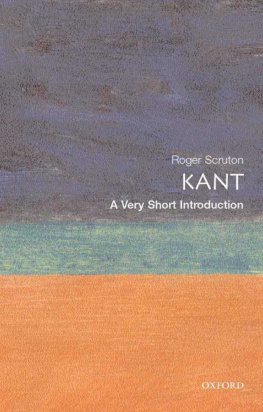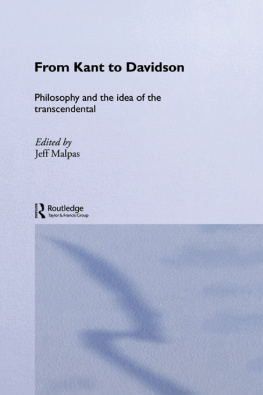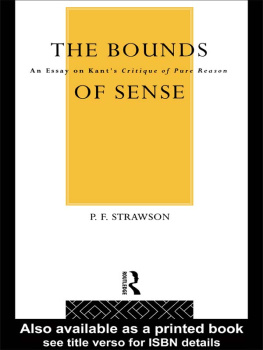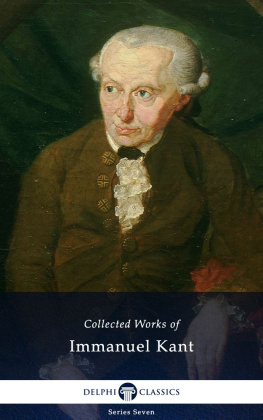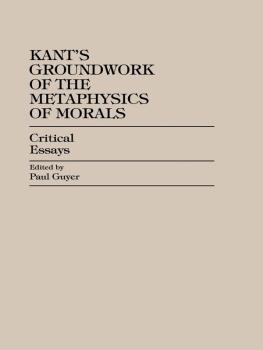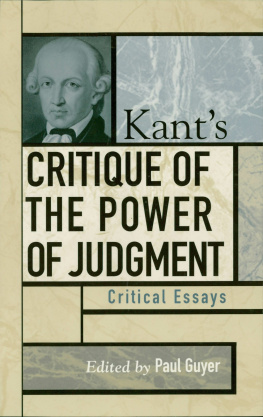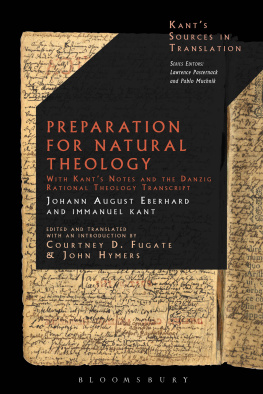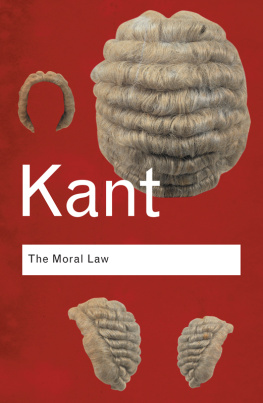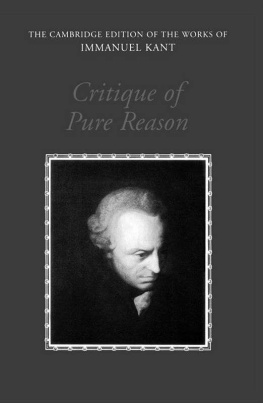Groundwork for the Metaphysics of Morals

Groundwork for the Metaphysics of Morals
IMMANUEL KANT
Edited and translated by Allen W. Wood
With an updated translation, introduction, and notes
Yale
UNIVERSITY PRESS
New Haven & London
First published by Yale University Press in 2002 as a volume in the Rethinking the Western Tradition series. This edition, with an updated translation, introduction, and notes, published by Yale University Press in 2018.
Copyright 2002, 2018 by Yale University.
All rights reserved.
This book may not be reproduced, in whole or in part, including illustrations, in any form (beyond that copying permitted by Sections 107 and 108 of the U.S. Copyright Law and except by reviewers for the public press), without written permission from the publishers.
Yale University Press books may be purchased in quantity for educational, business, or promotional use. For information, please e-mail (U.K. office).
Set in Times Roman type by Newgen North America, Austin, Texas.
Printed in the United States of America.
Library of Congress Control Number: 2017952054
ISBN 978-0-300-22743-7 (paper : alk. paper)
A catalogue record for this book is available from the British Library.
This paper meets the requirements of ANSI/NISO Z39.48-1992 (Permanence of Paper).
10 9 8 7 6 5 4 3 2 1
To Rega
once again and always
Contents
Abbreviations
Citations of Kants Writings
| Ak | Immanuel Kants Schriften. Ausgabe der kniglich preussischen Akademie der Wissenschaften (Berlin: W. de Gruyter, 1902), cited by volume:page number in this edition |
| Ca | Cambridge Edition of the Writings of Immanuel Kant (New York: Cambridge University Press, 19922016); this edition provides marginal Ak volume:page citations |
| Anth | Anthropologie in pragmatischer Hinsicht (1798), Ak 7 Anthropology from a Pragmatic Point of View, Ca Anthropology, History, and Education |
| BM | Von der Buchmacherei (1797), Ak 8 On Turning Out Books, Ca Anthropology, History, and Education |
| G | Grundlegung zur Metaphysik der Sitten (1785), Ak 4 Grundlegung zur Metaphysik der Sitten (178586), edited by Bernd Kraft and Dieter Schnecker (Hamburg: Felix Meiner Verlag, 1999) |
| I | Idee zu einer allgemeinen Geschichte in weltbrgerlicher Absicht (1784), Ak 8 dea Toward a Universal History with a Cosmopolitan Aim, Ca Anthropology, History, and Education |
| KpV | Kritik der praktischen Vernunft (1788), Ak 5 Critique of Practical Reason, Ca Practical Philosophy |
| KrV | Kritik der reinen Vernunft (1781, 1787), cited by A/B pagination Critique of Pure Reason, Ca Critique of Pure Reason |
| KU | Kritik der Urteilskraft (1790), Ak 5 Critique of the Power of Judgment, Ca Critique of the Power of Judgment |
| MA | Mutmalicher Anfang der Menschengeschichte (1786), Ak 8 |
| Conjectural Beginning of Human History, Ca Anthropology, History and Education |
| MS | Metaphysik der Sitten (17971798), Ak 6 Metaphysics of Morals, Ca Practical Philosophy |
| O | Was heit: Sich im Denken orientieren? (1786), Ak 8 What Does It Mean to Orient Oneself in Thinking? Ca Religion and Rational Theology |
| P | Prolegomena zu einer jeden knftigen Metaphysik (1783), Ak 4 Prolegomena to Any Future Metaphysics, Ca Theoretical Philosophy After 1781 |
| R | Religion innerhalb der Grenzen der bloen Vernunft (1794), Ak 6 Religion Within the Boundaries of Mere Reason, Ca Religion and Rational Theology |
| RH | Rezensionen von Herders Ideen zu einer Philosophie der Geschichte der Menschheit (178586), Ak 8 Reviews of Herders Ideas for a Philosophy of History of Humanity, Ca Anthropology, History, and Education |
| TP | ber den Gemeinspruch: Das mag in der Theorie richtig sein, taugt aber nicht fr die Praxis (1793), Ak 8 On the Common Saying: That May Be Correct in Theory but It Is of No Use in Practice, Ca Practical Philosophy |
| VE Coll | Vorlesungen ber Ethik Moralphilosophie Collins, Ak 27 Lectures on Ethics, Ca Lectures on Ethics |
| VE Mro | Vorlesungen ber Ethik Moralphilosophie Mrongovius, Ak 27 Lectures on Ethics, Ca Lectures on Ethics |
| VL | Vorlesungen ber Logik, Ak 9 Lectures on Logic, Ca Lectures on Logic |
Formulas of the Moral Law
Kant formulates the moral law in three principal ways. The first and third of these have variants which are intended to bring the law closer to intuition and make it easier to apply. These five principal formulations of the moral law will be abbreviated as follows.
First formula:
| FUL | The Formula of Universal Law: Act only in accordance with that maxim through which you at the same time can will that it become a universal law (G 4:421; cf. G 4:402), with its variant, |
| FLN | The Formula of the Law of Nature: So act, as if the maxim of your action were to become through your will a universal law of nature (G 4:421; cf. G 4:436). |
Second formula:
| FH | The Formula of Humanity as End in Itself: So act that you use humanity, as much in your own person as in the person of every other, always at the same time as an end and never merely as a means (G 4:429; cf. G 4:436). |
Third formula:
| FA | Formula of Autonomy:... the idea of the will of every rational being as a will giving universal law (G 4:431; cf. G 4:432) or Not to choose otherwise than so that the maxims of ones choice are at the same time comprehended with it in the same volition as universal law (G 4:440; cf. G 4:432, 434, 438), with its variant, |
| FRE | The Formula of the Realm of Ends: Act in accordance with maxims of a universally legislative member for a merely possible realm of ends (G 4:439; cf. G 4:433, 437, 438). |
Translators Introduction
Kants little book of 1785 is among the most significant texts in the history of ethics. For over two centuries it has been a standard of referencesometimes a model to be developed and expanded on, sometimes a target of criticism, often something of both. It has served these purposes for the German idealist and German Romantic traditions, for Victorians of the utilitarian school such as Mill and Sidgwick, for later British idealists such as Green and Bradley, for the neo-Kantians, for twentieth-century philosophers in both the continental and the Anglophone traditions, and for moral philosophers of all persuasions right down to the present day.
The depth and originality of the ideas contained in the Groundwork no doubt merit this influence. It is a famous book, but also a difficult and even obscure book, which is hard to understand and easy to misunderstand. (I am not kidding when I tell classes I teach that I did not understand it at all the first fifty times I read it.) Much of the
Next page

